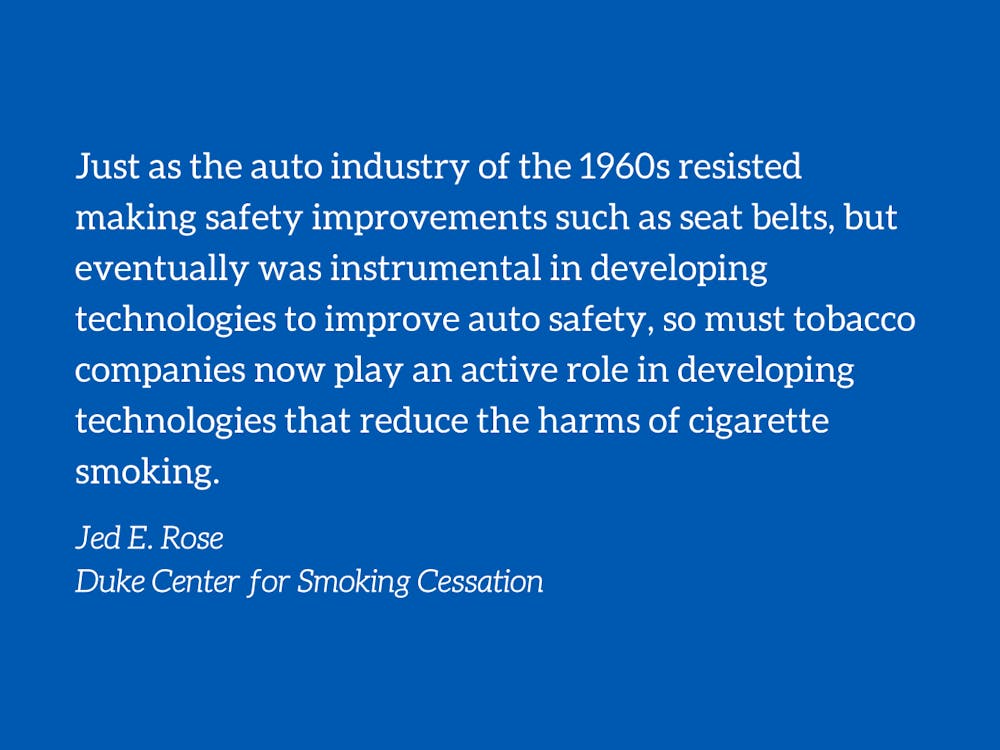In the Chronicle’s recent guest column, “Who trusts a tobacco-stained university in a pandemic?" Petronis and Meyerhoff advocate for a reckoning with Duke’s past and its relationships with the tobacco industry. Indeed, it is important for all of society to come to a reckoning with the history of interactions with the tobacco industry, an industry that has had a history of concealing the truth about the dangers of cigarette smoking. In emphasizing the distant past, however, the authors unfortunately ignore key developments in the recent past as well as in the evolving present. Since the passage of the Family Smoking Prevention and Tobacco Control Act of 2009, it has been impossible for tobacco companies to hide secret documents or conduct a misinformation campaign regarding the dangers of cigarette smoking. Moreover, the law acknowledges the vital role the industry must play in developing innovative products that reduce the dangers of combustible cigarettes. The products of combustion, not the addictive constituent nicotine, cause the overwhelming majority of smoking related death and disease. Nicotine can be provided in the absence of smoke, and recently, the Food and Drug Administration (FDA) authorized the marketing of a smokeless tobacco product (“snus”) that delivers nicotine while eliminating almost all of the toxins of cigarette smoke. In reviewing voluminous evidence, the FDA concluded the product is substantially less harmful than traditional cigarettes, and that its marketing is consistent with the protection of public health. Another product, iQOS, uses “heat-not-burn” technology, which eliminates most of the toxic byproducts of burning tobacco, and has also been authorized for sale in the U.S. Just today (July 7) the FDA officially announced that exclusive use of this product significantly reduces exposure to the toxins generated by burning cigarettes. Just as the auto industry of the 1960s resisted making safety improvements such as seat belts, but eventually was instrumental in developing technologies to improve auto safety, so must tobacco companies now play an active role in developing technologies that reduce the harms of cigarette smoking. This living present must be taken into account in any rational analysis of the relationship between universities and the tobacco industry.
The authors also state that “Rose has said he has no conflict of interest issues.” To be clear, I have repeatedly disclosed my financial relationships with the tobacco industry, which have included conducting sponsored research with JUUL Labs, Philip Morris USA and Philip Morris International, and a patent purchase agreement on a nicotine inhalation system with the latter company. I did not undertake these collaborations lightly, and came to grips with the difficult decision to accept tobacco industry funding around the year 1999, after seriously weighing the pros and cons, and consulting with trusted colleagues, friends and family. I arrived at the conclusion that the risks were outweighed by the benefits of using tobacco industry resources to provide better methods of helping smokers to quit using deadly cigarettes. I believe my prediction has been borne out, inasmuch as our use of tobacco research funding has led to significant advances in cessation treatment that we have published in peer-reviewed journals. Ultimately, the most important consideration in my mind has been to empower smokers to relinquish their addiction to cigarettes.
Any research study that is currently conducted at Duke to evaluate non-combustible tobacco products is held to rigorous scientific and ethical standards, and is subject to regulatory oversight by the Duke institutional review board, the Clinical Research Unit, the Office of Scientific Integrity, and in most cases, by the FDA. This research will establish whether non-combustible sources of nicotine help smokers relinquish deadly cigarettes and will objectively delineate how much residual risk may still be present. New approaches are desperately needed to combat the current toll of over 500,000 deaths annually in the US due to combustible cigarette use. By developing innovative approaches to treating cigarette addiction, and moreover, by using financial resources of the tobacco industry to make progress toward solving the pandemic of smoking related death and disease, we can and will help achieve a reckoning with the past.
Jed E. Rose, Ph.D., Director of the Duke Center for Smoking Cessation.
Get The Chronicle straight to your inbox
Signup for our weekly newsletter. Cancel at any time.

